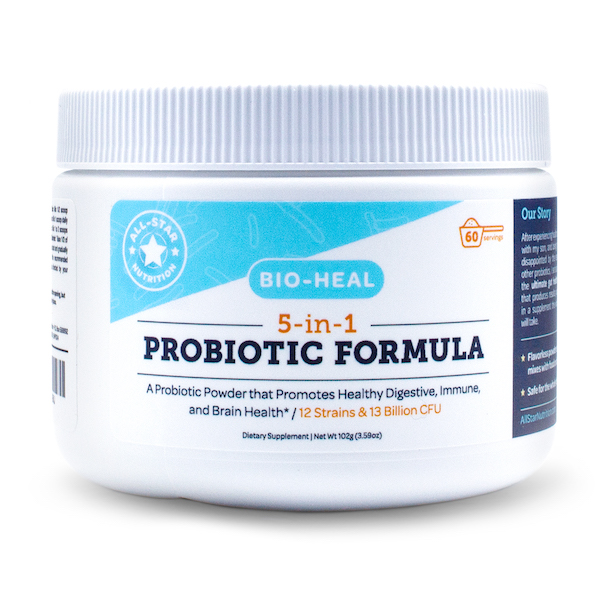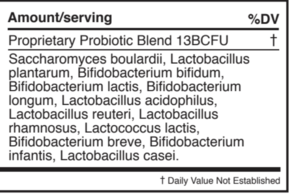
This post was originally created by our friends at The SpectrumMother.com
In continuation of her article on The Serious Medical Conditions Underlying Autism, researchers are revealing that autism is effectively the symptoms of deeper medical problems with the gut, which culminate in a drastically decreased life expectancy.
As discussed further in Is Autism Caused, and Cured, by Bacteria? New Studies Suggest So, many of these gut issues relate specifically to bacterial infections, with successful studies being performed to reverse, and even induce autism in rats by manipulating the gut bacteria alone.
In considering this, Revolutionary Bio-Heal by All Star Nutrition is a probiotic created by autism dad Marty Orefice, and is designed specifically for treating these bacterial issues associated with autism.

Bio-Heal contains all of the strains our favorite spectrum kiddos are missing. In addition, it includes the tremendously beneficial strain Saccharomyces Boulardii or simply speaking “Sacc B” which literally eats the Clostridia infections (more on Clostridia to come, be sure to subscribe).
Clostridia is extremely antibiotic-resistant and hard to kill (short of a fecal transplant), which is why the fact that this probiotic has Sacc B is so incredibly beneficial to those on the spectrum.
Okay, now let’s break down all of the beneficial strains in this revolutionary probiotic:

- Saccharomyces Boulardii (“Sacc B”): Sacc b is a strain of beneficial yeast that eatsthe highly antibiotic resistant dangerous bacteria Clostrida/C. diff. Clostrida has been show in various studies to be in high levels in those with autism. This is an extremely important key ingredient, as one of the only other primary alternatives in treating the Clostridia infections seen in autism is a fecal transplant.
- Lactobacillus Plantarum (“L. Plantarum”): In a double blind, randomized, placebo controlled study in Taiwan children aged 7-12 showed significant improvement in the autism symptoms related to opposition/defiance behaviors. In another double blind, randomized, placebo controlled study of children aged 3-16 it showed significantly improved emotional and behavioral scores.
- Bifidobacterium Bifidum (“B. Bifidum”): in this study b. bifidum was shown to reduce the intestinal permeability (or leaky gut) in newborn rat pups.
- Bifidobacterium Lactis (“B. Lactis”): also known as B. Animalis, studies indicate this can alleviate abdominal pain and distention.
- Bifidobacterium Longum (“B. Longum”): in a study of children with autism aged 2-4 it revealed that a depletion of this beneficial strain was associated with an increase of the dangerous strain Faecalibacterium prausnitzii.
- Lactobacillus Acidophilus (“L. Acidophilus”): in a study of 22 children aged 4-10 the oral supplementation of this showed increased ability to concentrate and follow directions.
- Lactobacillus Reuteri (“L. Reuteri”): has been shown in studies to reverse the social behavioral abnormalities seen in autism spectrum disorders and to increase oxytocin levels.
- Lactobacillus Rhamnosus (“L. Rhamnosus”): the results of a randomized controlled trial on 75 infants followed for 13 years showed that administration early in life may help to reduce the risk of developing autism and ADHD.
- Lactococcus Lactis (“L. Lactis”): has been shown in studies to reduce oxidative stress/inflammation.
- Bifidobacterium Breve (“B. Breve”): this study indicated that b. breve is dominant in the gut of infants and that a deficiency is implicated in the development of autism.
- Bifidobacterium Infantis (“B. Infantis”): this study showed that supplementing this has a positive impact on baby’s gut microbes for up to a year.
- Lactobacillus Casei (“L. Casei”): was shown to reduce anxiety in this study.
Several pieces of evidence suggest that S. Boulardii represents the most effective probiotic that can prevent or, together with other agents, treat antibiotic-associated diarrhea and recurrent CDI [Clostridia Difficile Infection]
https://www.ncbi.nlm.nih.gov/pmc/articles/PMC3296087/
In our own recovery journey, my son has been on this probiotic for only two weeks. Despite everything else we have addressed, nothing else has to lead to such immediate and drastic gains in his speech, cognition, pretend play and overall happiness. There are literally legions of parents that attest to similar, nearly miraculous testimonials of this truly incredible product.
Seriously #spectrumparent’s, this probiotic is worth looking into.
While many probiotics may have little to no effect, this one is different in that it helps to truly heal the gut and usher in the recovery of the serious underlying issues that drive autism, because it’s specifically formulated for autism.
This probiotic is so powerful that it can induce an herxheimer reaction, which can initially look like increased behavioral issues.
A way to think about it is (and it’s explained on their product FAQ) that our spectrum kids are often full of very bad bacteria. When these good strains start to crowd in, the bad strains don’t want to vacate without a fight and can release toxins.
Herxheimer reactions can be mitigated by slightly increasing the amount of probiotic given to flood in more good bacteria, along with using activated charcoal.
I hope this probiotic is as much of a blessing to your family as it has been to mine. Be sure to subscribe as I will continue publishing new research-backed articles and potential treatments on an ongoing basis.
Thank you to TheSpectrumMother.com for this post and valuable information.

Research Studies Cited:
- https://www.ncbi.nlm.nih.gov/pmc/articles/PMC3296087/
- https://www.ncbi.nlm.nih.gov/pmc/articles/PMC6539237/
- https://www.ncbi.nlm.nih.gov/pubmed/30689174
- https://www.ncbi.nlm.nih.gov/pubmed/31043927
- https://www.ncbi.nlm.nih.gov/pmc/articles/PMC6521002/
- https://www.ncbi.nlm.nih.gov/pmc/articles/PMC6471505/
- https://www.ncbi.nlm.nih.gov/pmc/articles/PMC6305749/
- http://europepmc.org/articles/PMC5155168/
- https://www.ncbi.nlm.nih.gov/pmc/articles/PMC5408485/
- https://www.ncbi.nlm.nih.gov/pmc/articles/PMC4838534/



